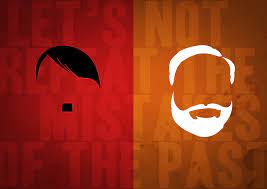Bane of Charismatic Leadership

Manoj
1989 EE
The latest bout of gory and heart wrenching ethnic cleansing unleashed by Benjamin Netanyahu, the leader of a so-called parliamentary democracy compels one to revisit lessons from history, specifically on authoritarianism, the demagogues it produces, and the behavioural changes induced in an otherwise benign society. Looking at the evolution of the political scenario around the globe in the last 25 years, one can only wonder how wrong Francis Fukuyama was with his theory of “End of History”. Electoral autocracy is firmly in saddle in many large nations, and even one of the oldest modern democracies went through the Trump phenomenon. There is chaos all around and the “Doomsday Clock” has never been closer to midnight since its inception.
There are many factors that makes history repeat. In my opinion, the major ones are the prevailing socio-economic system, the response of the society to it and the nature of the leadership. If there is an active and critical interaction between the society and the prevailing system, where the decisions and its outcomes are regularly examined and calibrated, the likelihood of attaining a desirable balance and maintaining the same is high. The reason why a prevailing socio-economic system emerges is a big topic in itself. So, out of the three factors mentioned, let us examine two; the autocratic leadership and how the people get conditioned.
Max Weber is amongst the foremost sociologists who defined the types of leadership based on how the leaders derive their authority. These are, traditional, rational-legal, and charismatic. The first type is the authority legitimised by tradition wherein the authority of a ruler is established by long standing custom or belief. Examples are monarchies, the graded hierarchy practiced by the way of caste system, or the power bestowed on a religious leader. In a system like monarchy, people are subjects and do not have much role in the governance. They do their duty and depend on the benevolence of the leader for their wellbeing. The second type is rational-legal, wherein the authority is based on a robust rule of law and justice system, formed through a rational process. In such a system, the leader is only an elected official, chosen by the people to implement the decisions taken in a democratic manner. The third type is the charismatic authority, wherein the leader’s charisma forms the source of authority. This type has been troublesome always and even now, where many modern democracies have deteriorated into electoral autocracies.

Modern democracies are expected to have a rational-legal basis for authority. However, what we see often is that the social distress created by sub-optimal systems like neo-liberalism and post-capitalist techno feudalism creates leaders to whom the citizens bestow the authority due to their “charisma”. The leader transforms into a messiah and the citizens surrender their agency to the charismatic leader. Normally, in a modern democracy, the question; if not “X”, “then who” should be the last one, but we hear this the loudest during an election. Is “person” not important and isn’t it idealistic to not ask the question “Who”? The answer lies in what is charismatic leadership.
First and foremost, charisma is a construct and is not based on any foundation. According to Weber, “the term charisma refers to an extraordinary quality of a person, regardless of whether this quality is actually, alleged or presumed.” Such a construct is created by a dedicated team nurtured and funded most often by the oligarchs produced by prevailing sub optimal systems like neoliberalism. Once a charismatic leader is created, the citizens are reduced to mere followers or disciples, who have “faith” in the qualities and power of the leader.
Faith per se is nebulous and can be bestowed on person, ideology, or things. It is like the faith in an idol or a holy text. The same idol (of the same material and size) in two different locations are alleged to have different powers and based on such beliefs, people throng to one and not the other. It may not take much to reverse such constructs. Ancient temples (or any other shrines), which once was the reining deity of a locality, or a kingdom can be seen in ruins with no one interested in them anymore.
Idolised charismatic leaders can also experience such a fall and their popularity will continue only till the people have “faith” in their power and they are able to “demonstrate” this power continuously. The continuous demonstration of power is through the follower or fan base, who are willing to do anything for the leader. Their allegiance is only to the leader. They are continuously told about the greatness of the leader, his transformational role in instilling pride and greatness. Typically, most of the measures used for propagating the greatness are the ones that appeal to emotions. Gas lighting, big lies are all part of the propaganda machinery. Anyone who questions this narrative with facts are relegated as “the other” and the enemy who is out there is to destroy the leader and the land. The other key aspect of such a leadership is how they instil a sense of perennial insecurity and instability. The society is compelled to be in a paranoid state, continuously vigilant against the enemy, who gets redefined continuously.
Once a strong charismatic leader takes over, the social transformation is quick. Very often, major cleavages develop in an otherwise benign society, leading to large scale sectarian violence, lynching and regressing to fascism. The social groups created by such leadership, bring out the worst instincts of human beings who start as non-state actors and once the violence of such non-state actors are normalised, they form part of the state, while “the other” is humiliated, disempowered, marginalised and finally exterminated. There are multiple studies that show behavioural changes in human beings based on the power of roles and symbols.
Stanford prison experiment was a two-week psychological experiment that simulated a prison environment to study the power dynamics and how it shapes the participants’ behaviour. Volunteers were hired from the local community based on newspaper advertisements, screened for psychological stability and the shortlisted ones were randomly assigned as prisoners and guards. The guards were given uniforms and instructed to stop the “prisoners” from escaping. They were specifically instructed not to physically harm the “prisoners”. The experiment became dangerous very quickly with the guards almost immediately getting into their role. Due to extreme psychological trauma inflicted on the participants, the study had to be stopped within a week. While the experiment proved beyond doubt that ordinary individuals could engage in dehumanising behaviour based on the assumed authority, the methodology adopted was severely criticised and lead to improvements in the ethical requirements for human experiments.

Another one that demonstrated the obedience to authority was the Stanley Milgram experiment, wherein ordinary people were easily influenced into committing grave atrocities by convincing them that they have an order from a legitimate authority. In this experiment there were 3 roles: teacher, learner, and experimenter. The teacher was hired, while the learners and experimenters were part of the team and knew what was happening. The teacher was instructed to administer shock to the learner whenever the learner made a mistake. The shock was from 15 volts to 450 volts. whenever the teacher hesitated to go to higher values, the experimenter prodded the teacher with certain commands, which made it sound like a legitimate order from an official. The result was appalling with most teachers choosing to administer shocks that could be fatal, proving that people tend to obey orders without looking at the consequence to others if they recognise their authority as legally based.
The outcome of these experiments should not be a surprise if we are aware of history. There are numerous occasions wherein fellow humans have turned in to mass murderers based on the legitimacy of official policies or commands from the state. Nuremburg trial and its findings are full of such cases where the officers deposed that they were just obeying orders. One such hearing was reported as a series for The New Yorker by Hannah Arendt and later released as a book “Eichmann in Jerusalem: A report on the Banality of Evil”. Eichmann, a high-ranking Nazi official, responsible for coordinating the logistics of the Holocaust, in his defence, pleaded not guilty as he was doing his duty. Hannah Arendt argues in the book that Eichmann was neither a fanatic nor a monster but an ambitious bureaucrat who was following his duties without deep moral reflection. The central theme of the study is that, under an authoritarian system, evil acts can be performed by ordinary people who are following the norms of the society.
As per the latest “Global State of Democracy Indices” published by International IDEA (https://www.idea.int/), there is a democratic recession globally for the last 6 years. The report states that “Virtually half the countries in our dataset have suffered a notable decline in at least one factor of democratic performance over the last five years”. The report further states “Declines have occurred in the very foundations of democracy, revealing weaknesses in the credibility of electoral processes, the ability of legislatures to act as checks on executive overreach and in people’s equal access to the institutions of justice. This institutional weakness is compounded by continuing declines in core democratic rights, including freedom of expression, freedom of association and assembly and freedom of the press. Such deterioration has touched every region of the world and a broad array of countries with varying levels of democratic performance.” Our country, which prides in being the world’s largest democracy, has been marked as an electoral autocracy by the Sweden based V-Dem institute (https://v-dem.net/) in its latest report on democracy. More worryingly, Genocide watch (https://www.genocidewatch.com/) marked India at stage 5 (Organisation), which is mid-way in their Ten Stages of Genocide index.
It is only after the withering away of the British Empire in the post world-war era and balancing of power in a bipolar world that democracy took roots in many countries, leading to progress and stability as a peace dividend. However, such a system of government is neither inevitable nor guaranteed. On the contrary, it is highly fragile and unless we, the people continuously educate ourselves and steady the rocking boat regularly, it can capsize any time. We should not fall to the myth of the “charismatic” or “strong” leader. There can be no messiah who can do the job on our behalf. Such charismatic strong men have consistently proven to be toxic, striking a blow at the roots of whatever they have led, be it a country or a corporation. The damages caused by them can take generations to undo.
At this juncture when social democracy is under threat, it is important for us to recall what Dr. B R Ambedkar said in his concluding remarks during the Constituent Assembly debates. “The second thing we must do is to observe the caution which John Stuart Mill has given to all who are interested in the maintenance of democracy, namely, not “to lay their liberties at the feet of even a great man, or to trust him with powers which enable him to subvert their institutions”.













